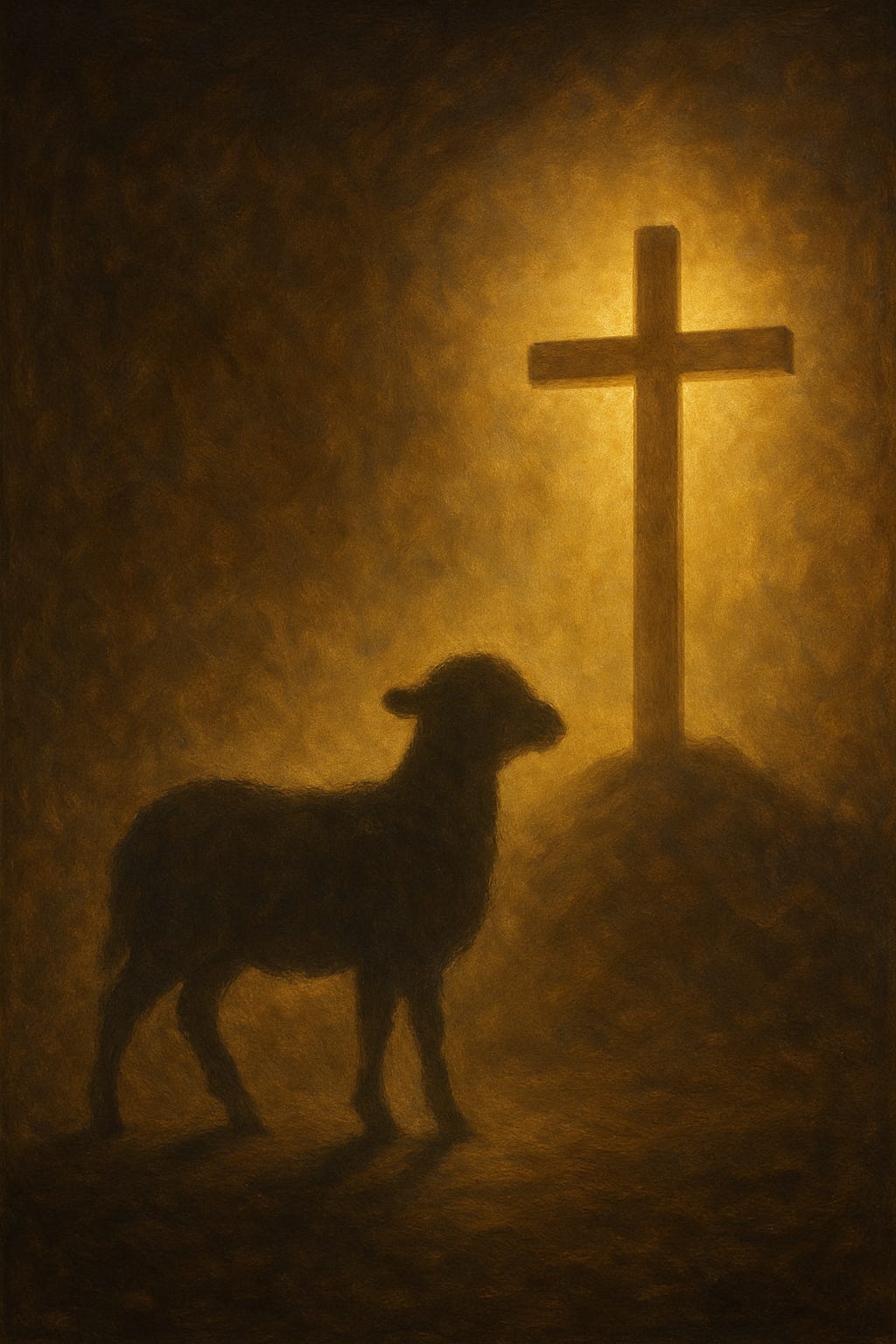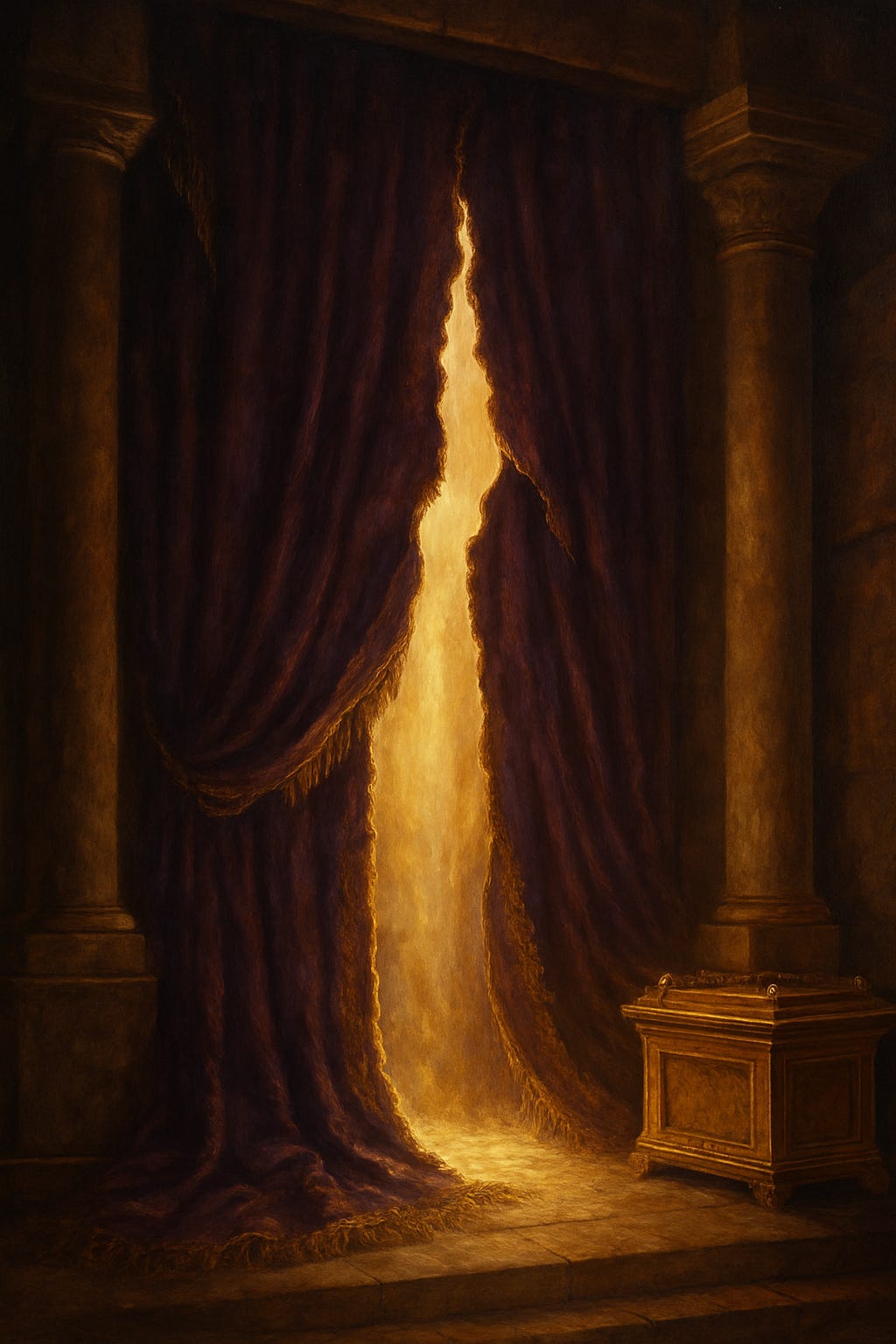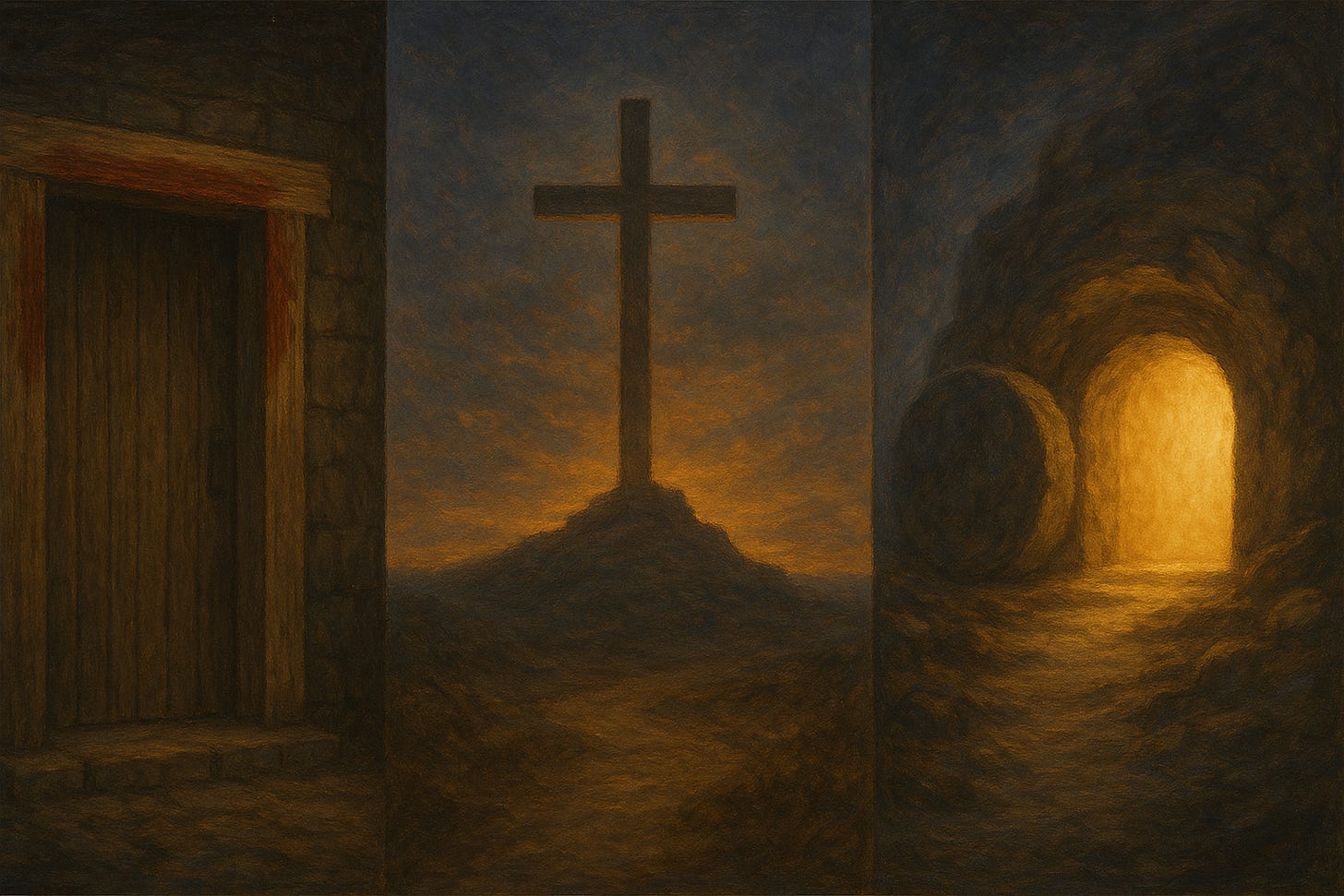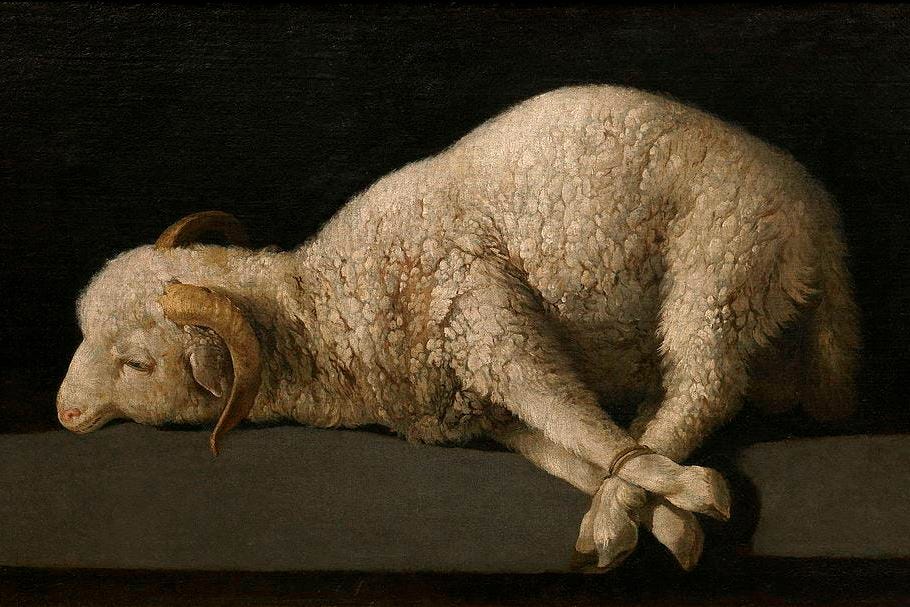The Shadows Have Passed
Why the Church Should Refrain from Participating in Old Covenant Ceremonies and Rituals
5 For freedom Christ has set us free; stand firm therefore, and do not submit again to a yoke of slavery. 2 Look: I, Paul, say to you that if you accept circumcision, Christ will be of no advantage to you. 3 I testify again to every man who accepts circumcision that he is obligated to keep the whole law. 4 You are severed from Christ, you who would be justified by the law; you have fallen away from grace. 5 For through the Spirit, by faith, we ourselves eagerly wait for the hope of righteousness. 6 For in Christ Jesus neither circumcision nor uncircumcision counts for anything, but only faith working through love.
Galatians 5:1–6.
Easter is almost upon us, and with it comes a season when many churches and Christian households, in celebration of Resurrection Sunday, observe Passover with a Seder meal. It’s also not uncommon for some of these same churches to commemorate other Jewish feast days throughout the year. For example, a previous church I attended would host a Hanukkah event, during which even the men were expected to wear kippahs. These kinds of practices are often well-intentioned, aiming to highlight the Jewish roots of the Christian faith and perhaps to deepen one’s appreciation for the Lord’s Supper.
Certainly, there is educational value in understanding the Old Testament context of Christ’s death, burial, and resurrection. However, we must ask: should the church be participating in the ceremonial practices of the old covenant now that the new covenant has come?
No.
Of course the reasons are deeply theological in nature, specifically rooted in the sufficiency and finality of Christ’s work.
Types and Shadows: A Temporary Arrangement
The Seder celebrates the Exodus that God provided to His people. It is simply the feast that is celebrating the Passover and the Exodus. However, we see throughout the prophets, that God’s people will one day celebrate something even greater:
Isaiah 43:18-19
Thus says the LORD, who makes a way in the sea, a path in the mighty waters, who brings forth chariot and horse, army and warrior; they lie down, they cannot rise, they are extinguished, quenched like a wick: "Remember not the former things, nor consider the things of old. Behold, I am doing a new thing; now it springs forth, do you not perceive it? I will make a way in the wilderness and rivers in the desert.
Jeremiah 3:15–17
‘And I will give you shepherds after my own heart, who will feed you with knowledge and understanding. And when you have multiplied and been fruitful in the land, in those days, declares the LORD, they shall no more say, “The ark of the covenant of the LORD.” It shall not come to mind or be remembered or missed; it shall not be made again. At that time Jerusalem shall be called the throne of the LORD, and all nations shall gather to it, to the presence of the LORD in Jerusalem, and they shall no more stubbornly follow their own evil heart.
In these two passages, we see a clear pattern emerge. In Isaiah, the Lord commands His people not to dwell on the former things (the Passover, the Exodus, etc.) because He is about to accomplish something far greater. Likewise, in Jeremiah, during the Messianic age when the Gentiles are being gathered in, God’s people are to even forget the ark of the covenant!
Thus the Old Covenant sacrificial system, ceremonial laws, festivals (including Passover) were prescribed directly by God as a means to point forward to Christ. As the author of Hebrews (absolutely definitely Paul) explains, these were "a shadow of the good things to come instead of the true form of these realities" (Hebrews 10:1). Paul (again) says similarly in Colossians 2:16–17:
“Therefore let no one pass judgment on you in questions of food and drink, or with regard to a festival or a new moon or a Sabbath. These are a shadow of the things to come, but the substance belongs to Christ.”
The Westminster Confession of Faith (WCF) makes this point clearly:
“Beside this law, commonly called moral, God was pleased to give to the people of Israel… ceremonial laws, containing several typical ordinances… all which ceremonial laws are now abrogated under the New Testament.” (WCF 19.3)
These types and shadows pointed forward to the finished work of Christ, and “God the Son was in, with, and under the types and shadows.” 1 The Passover was not an end in itself, but a signpost. Its lamb, its unleavened bread, its bitter herbs, all served as pedagogical symbols pointing toward the Lamb of God (John 1:29).
Now that the substance has come, to return to the shadows is to miss the point.
The Lord’s Supper: Fulfillment, Not Continuation
When Christ instituted the Sacrament of the Lord’s Supper during the Passover meal (Luke 22:14–20), He was not continuing and prescribing the Passover for the Church, He was fulfilling everything that meal pointed to. “This is my body… this is my blood of the covenant,” He said. In these words, Christ declared the old covenant meal fulfilled and established a new one, ratified in His blood.
Again, the Westminster Confession is clear:
“The sacraments of the Old Testament, in regard of the spiritual things thereby signified and exhibited, were, for substance, the same with those of the New. But under the gospel… the sacraments… are the baptism of Christ and the Lord’s Supper.” (WCF 27.5)
This leaves no room for the Old Covenant meals to continue in practice, not even as sentimental celebrations. Zacharias Ursinus commenting on the Belgic Confession Article 25:
Article 25: Of the abolishing of the Ceremonial Law.
We believe, that the ceremonies and figures of the law ceased at the coming of Christ, and that all the shadows are accomplished; so that the use of them must be abolished amongst Christians; yet the truth and substance of them remain with us in Jesus Christ, in whom they have their completion. In the meantime, we still use the testimonies taken out of the law and the prophets, to confirm us in the doctrine of the gospel, and to regulate our life in all honesty, to the glory of God, according to his will.
That the ancient Passover, with all the other types which prefigured the Messiah which was to come, was abolished at the coming of Christ, is evident,
1. From the whole argument of the Apostle in the Epistle to the Hebrews respecting the abolishing of the legal shadows in the New Testament. “The priesthood being changed, there is made of necessity a change also of the law.” “In that he saith, A new covenant, he hath made the first old.” (Heb. 7:12; 8:13.)
2. From the fulfillment or these legal shadows. “These things were done that the Scriptures might be fulfilled. A bone of him shall not be broken.” “Christ our Passover is sacrificed for us.” (John 19:36. 1 Cor. 5:7.)
3. From the substitution of the New Testament; for Christ, when he was about to suffer, and die and sacrifice himself as the true Passover, closed the ordinance relating to the paschal lamb with a solemn feast, and instituted and commanded his Supper to be observed by the church in the place of the old passover. “With desire, I have desired to eat with you this passover, before I suffer.” “This do in remembrance of me.” (Luke 22:15, 19.) Christ here commands the supper, not the ancient passover, to be celebrated in remembrance of him. As baptism has, therefore, succeeded circumcision, so the Lord’s supper has succeeded the passover in the New Testament.
Reverting to Old Covenant Practices Undermines the Gospel
I realize the title of this section may seem strong, and I want to be clear: I am not making a salvation judgment about brothers and sisters in Christ who choose to celebrate these sentimental events. However, we must acknowledge that there is a real danger in returning to Old Covenant ceremonies, because doing so risks undermining the sufficiency of Christ’s finished work.
Paul's concern in Galatians was precisely this:
9 But now that you have come to know God, or rather to be known by God, how can you turn back again to the weak and worthless elementary principles of the world, whose slaves you want to be once more? 10 You observe days and months and seasons and years! 11 I am afraid I may have labored over you in vain.
Galatians 4:8–11
Calvin commenting on the passage:
When he calls the ceremonies beggarly elements, he views them as out of Christ, and, what is more, as opposed to Christ. To the fathers they were not profitable exercises and aids to piety, but efficacious means of grace. But then their whole value lay in Christ, and in the appointment of God. The false apostles, on the other hand, neglecting the promises, endeavored to oppose the ceremonies to Christ, as if Christ alone were not sufficient.
I grant that many today are not consciously believe that they are undermining the Gospel, but the act of reviving itself can cause confusion. Christ didn’t tear down the dividing wall of hostility (Eph. 2:14) so that Gentile Christians could sentimentally observe the ceremonial law of the Old Covenant. Rather Christ “by abolishing the law of commandments expressed in ordinances, that he might create in himself one new man in place of the two, so making peace, 16 and might reconcile us both to God in one body through the cross, thereby killing the hostility” (Eph. 2:15–16).
The church today is no longer under the administration of Moses, but the covenant people of God now are living under the fulness of the New Covenant, nourished not by types and shadows, but through the ordinary means of grace Christ has appointed.
Celebrating (the New) Passover
“Let us therefore celebrate the festival, not with the old leaven, the leaven of malice and evil, but with the unleavened bread of sincerity and truth.”
(1 Corinthians 5:7–8)
Christ is our true Passover. By His shed blood, the wrath of God has passed over His people, and the greater Exodus from sin and death has been accomplished:
8 Therefore it says, “When he ascended on high he led a host of captives, and he gave gifts to men.” (Eph 4:8)
One of the many Judaizing heresies of the Papists was the reintroduction of ceremonial and sacrificial elements into the life of the church. As the Westminster Confession of Faith declares:
“The Popish sacrifice of the mass… is most abominably injurious to Christ’s one, only sacrifice, the alone propitiation for all the sins of the elect.”
(WCF 29.2)
This is deeply grievous because it directly undermines the finality and sufficiency of Christ’s once-for-all sacrifice. The Romanists teach that the Mass is an unbloody, propitiatory re-presentation of Christ’s one sacrifice, an ongoing offering for sins. In doing so, they have effectively resurrected the ceremonial system of the Old Covenant.
Rome has not only revived the notion of continual sacrifice (just read Leviticus), but has also reintroduced the incense (Exodus 30:34–38), priestly vestments from (Exodus 29:5–6), the Levitical priesthood (see Leviticus), mandatory holy days (Leviticus 23:4–8, 10, 16, 24, 26–32, 34), prescribed pilgrimages (Exodus 23:14–17), and even mediatorial figures such as Moses and Aaron—climaxing in the Pope, who is blasphemously regarded as the Vicar of Christ on earth (cf. WCF 25.6, 1646 edition).
In all of this, Rome reestablishes the very shadows that were fulfilled in Christ, and reintroduces the “weak and worthless elementary principles of the world” that Paul so forcefully warned against in Galatians 4:9–11.
But Scripture could not be clearer: “It is finished” (John 19:30), our Lord declared from the cross. And again, “By a single offering He has perfected for all time those who are being sanctified” (Heb. 10:14). Any attempt to perpetuate or replicate is blasphemously offensive to the all-sufficient work of Christ.
This same principle applies whenever we seek to revive the ceremonies of the Old Covenant. Even if we do not intend them as sacrifices, treating these expired types as spiritually edifying practices subtly shifts our focus away from the once-for-all work of Christ.
In this New Covenant era, we are to worship “in Spirit and in truth” (John 4:24). We do not need to reenact Jewish ceremonies to appreciate the redemptive-historical plan of God. We have the Scriptures. We have the gospel. We have Christ.
Let us not return to the shadows, but like Jacob (Genesis 32:22-32), cling to the substance, our Lord Himself.
The Passover.
The Seder.
The ceremonies.
They have served their purpose. The Lamb has been slain. The tomb stands empty.
Therefore, let us not partake in the elements of an expired administration, but in the fullness and power of the New Covenant.
https://heidelblog.net/2020/03/one-important-difference-between-the-reformed-and-some-particular-baptists-god-the-son-was-in-with-and-under-the-types-and-shadows/







In as far as you make the argument that the ceremonial practices of the Old Testament should no longer be practiced, I can fully agree with that sentiment/belief. We indeed have the fulfillment of all these old celebrations and types/shadows within the redemptive work of Christ.
Where I'm inclined to disagree is in personal practice of some of these elements, not as an obligation or a desire to reestablish Old Testament practices, but as an even more rich way to appreciate what they represented and how they've been fulfilled. I'm afraid in my case, I'll have to give a more personal example:
When COVID was at its worst and we could not join our church family for celebrations under penalty of the law, my family decided to research the Seder meal as a way to celebrate Maundy Thursday, or the Last Supper. We looked deep into the practices therein: why certain foods were used, what Psalms were recited/sung, the significance of each cup, the unleavened bread, etc. This brought such a deeper meaning to our Easter celebration the following Sunday, that for a few years after we would hold a Seder on Maundy Thursday for these specific purposes: to deepen our understanding of Scripture, and not to fulfill any sense of obligation in observing the Passover or any other such Old Testament celebration. (How wonderful it is to know that on the night Christ prepared himself to be sacrificed for the sins of the world, he likely recited Psalm 118 with his disciples, they possibly not fully understanding that "the stone that the builders rejected" was indeed about to become "the chief cornerstone.")
As far as concerns the other Levitical holidays (and additions, such as Purim and Hanukkah) they can also be viewed in a similar manner. Hanukkah for example, is a memorial of a miracle and a victory over oppressors and was a crucial stepping point in God's prophetic timeline to arrange for the birth of His son, Jesus Christ.
No, one should probably not go so far as to wear a yarmulke/kippah or necessarily worry about reciting blessings in order exactly 18 minutes before sundown. There is, however, nothing I can see that would be against God's will by lighting a Hanukkiah during that time of year, much as the Church today (those who celebrate Advent) mark the passing of Christmastide with the lighting of candles each Sunday morning until the celebration of Christ's birth.
We draw a dangerous line in this way much how others will not put up a Christmas tree or hide Easter eggs in an attempt to de-paganize Christianity or avoid anything with an appearance of worldliness. These celebrations are Christian and celebrate the most important events in our collective history as followers of Christ and citizens of His Kingdom.
As to the practices observed in the Roman Catholic church, I cannot offer an argument for or against. I am a practicing Anglican at this time, and while the services at my church appear identical to those of Rome, we are quite different and have a very different understanding of both the Eucharist & episcopal leadership.
I love your passion for the truth and commend you for your boldness in this matter. Indeed, there are many in the church that wish to seek out their "Hebrew roots" or to reinstitute old practices for the sake of those practices. They are in danger of the warning Paul gives in Galatians, which you aptly recounted here. (I cannot speak for ethnically Jewish Christians who still practice some Old Testament laws. Their case may very well be different having grown up in such practices and being surrounded by them.)
Nevertheless, I think it a mistake to be stringent about personal choices concerning such practices that may very well edify individual believers. That being said, I appreciate your thoughtful work always.